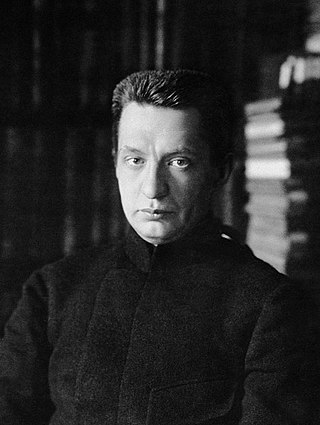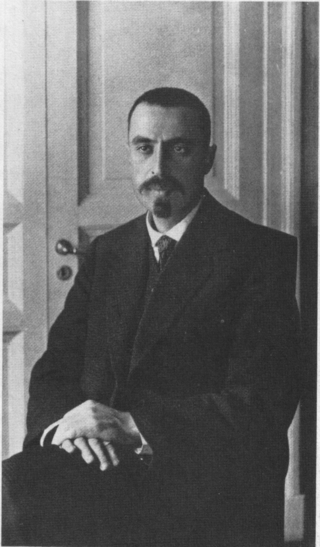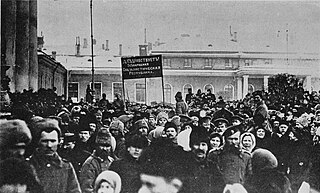
Alexander Fyodorovich Kerensky was a Russian lawyer and revolutionary who led the Russian Provisional Government and the short-lived Russian Republic for three months from late July to early November 1917 (N.S.)

The October Revolution, also known as the Great October Socialist Revolution, October coup, or Bolshevik coup was a revolution in Russia led by the Bolshevik Party of Vladimir Lenin that was a key moment in the larger Russian Revolution of 1917–1923. It was the second revolutionary change of government in Russia in 1917. It took place through an armed insurrection in Petrograd on 7 November 1917 [O.S. 25 October]. It was the precipitating event of the Russian Civil War.

The Russian Revolution was a period of political and social change in the Russian Empire, starting in 1917. This period saw Russia abolish its monarchy and adopt a socialist form of government following two successive revolutions and a bloody civil war. The Russian Revolution can also be seen as the precursor for the other European revolutions that occurred during or in the aftermath of World War I, such as the German Revolution of 1918–1919.

Irakli Tsereteli was a Georgian politician and a leading spokesman of the Social Democratic Party of Georgia and later Russian Social Democratic Labour Party (RSDLP) during the era of the Russian Revolutions.

Pavel Nikolayevich Milyukov was a Russian historian and liberal politician. Milyukov was the founder, leader, and the most prominent member of the Constitutional Democratic party. He changed his view on the monarchy between 1905 and 1917. In the Russian Provisional Government, he served as Foreign Minister, working to prevent Russia's exit from the First World War.
A provisional government, also called an interim government, an emergency government, a transitional government or provisional leadership, is a temporary government formed to manage a period of transition, often following state collapse. Provisional governments are generally appointed, and frequently arise, either during or after civil or foreign wars, or during difficult times such as during invasion, economic crisis, or widespread infiltration of saboteurs and counter-revolutionaries such as during the French Revolution.

The Russian Republic, referred to as the Russian Democratic Federal Republic in the 1918 Constitution, was a short-lived state which controlled, de jure, the territory of the former Russian Empire after its proclamation by the Russian Provisional Government on 1 September 1917 in a decree signed by Alexander Kerensky as Minister-Chairman and Alexander Zarudny as Minister of Justice.

Volodymyr Kyrylovych Vynnychenko was a Ukrainian statesman, political activist, writer, playwright and artist who served as the first prime minister of the Ukrainian People's Republic.

Jaan Tõnisson was an Estonian statesman, serving as the Prime Minister of Estonia twice during 1919 to 1920, as State Elder from 1927 to 1928 and in 1933, and as Foreign Minister of Estonia from 1931 to 1932.

Nikoloz Chkheidze commonly known as Karlo Chkheidze, was a Georgian politician. In the 1890s, he promoted the Social Democratic movement in Georgia. He became a key figure in the Russian Revolution as the Menshevik president of the Executive Committee of the Soviet of Petrograd. Later he served as president of the Transcaucasian Sejm, and he held office in the Transcaucasian Democratic Federative Republic. Later he became president of parliamentary assemblies of the Democratic Republic of Georgia, National Council, Constituent Assembly and Parliament.
Directorate may refer to:

The State Duma, also known as the Imperial Duma, was the lower house of the legislature in the Russian Empire, while the upper house was the State Council. It held its meetings in the Tauride Palace in Saint Petersburg. It convened four times between 27 April 1906 and the collapse of the empire in February 1917. The first and the second dumas were more democratic and represented a greater number of national types than their successors. The third duma was dominated by gentry, landowners, and businessmen. The fourth duma held five sessions; it existed until 2 March 1917, and was formally dissolved on 6 October 1917.

The Ukrainian War of Independence, also referred to as the Ukrainian–Soviet War in Ukraine, lasted from March 1917 to November 1921. It saw the establishment and development of an independent Ukrainian republic, most of which was absorbed into the Ukrainian Soviet Socialist Republic between 1919 and 1920. The Ukrainian Soviet Socialist Republic was one of the constituent republics of the Soviet Union between 1922 and 1991.
The Council of People's Ministers of Ukraine was the main executive institution of the Ukrainian People's Republic. Its duties and functions were outlined in the Chapter V of the Constitution of the Ukrainian People's Republic.

The Russian Provisional Government was a provisional government of the Russian Empire and Russian Republic, announced two days before and established immediately after the abdication of Nicholas II. The intention of the provisional government was the organization of elections to the Russian Constituent Assembly and its convention. The provisional government, led first by Prince Georgy Lvov and then by Alexander Kerensky, lasted approximately eight months, and ceased to exist when the Bolsheviks gained power in the October Revolution in October [November, N.S.] 1917.

The Mensheviks were a faction of the Marxist Russian Social Democratic Labour Party (RSDLP) which split with Vladimir Lenin's Bolshevik faction at the Second Party Congress in 1903. The Mensheviks were led by Julius Martov and Pavel Axelrod.

The Ukrainian People's Republic (UPR) was a short-lived state in Eastern Europe. Prior to its proclamation, the Central Council of Ukraine was elected in March 1917 as a result of the February Revolution, and in June, it declared Ukrainian autonomy within Russia. Its autonomy was later recognized by the Russian Provisional Government. Following the October Revolution, the Central Council of Ukraine denounced the Bolshevik seizure of power and proclaimed the Ukrainian People's Republic with a territory including the area of approximately eight Russian imperial governorates. It formally declared its independence from Russia on 22 January 1918.

The February Revolution, known in Soviet historiography as the February Bourgeois Democratic Revolution and sometimes as the March Revolution, was the first of two revolutions which took place in Russia in 1917.
Events from the year 1917 in Russia.














